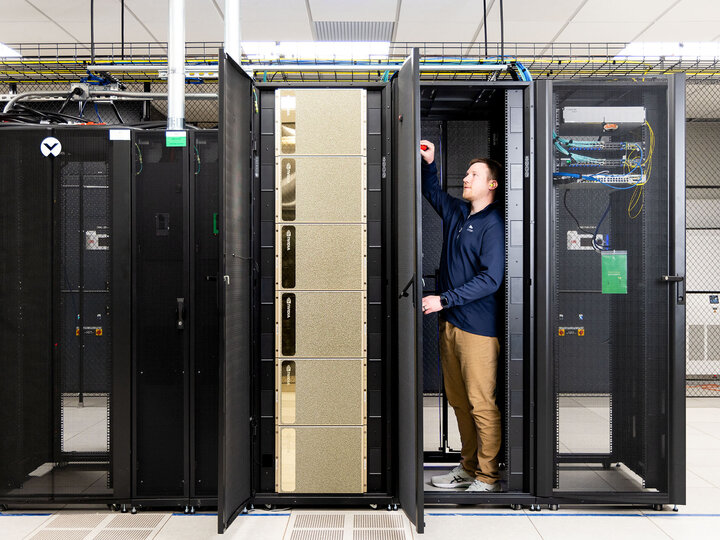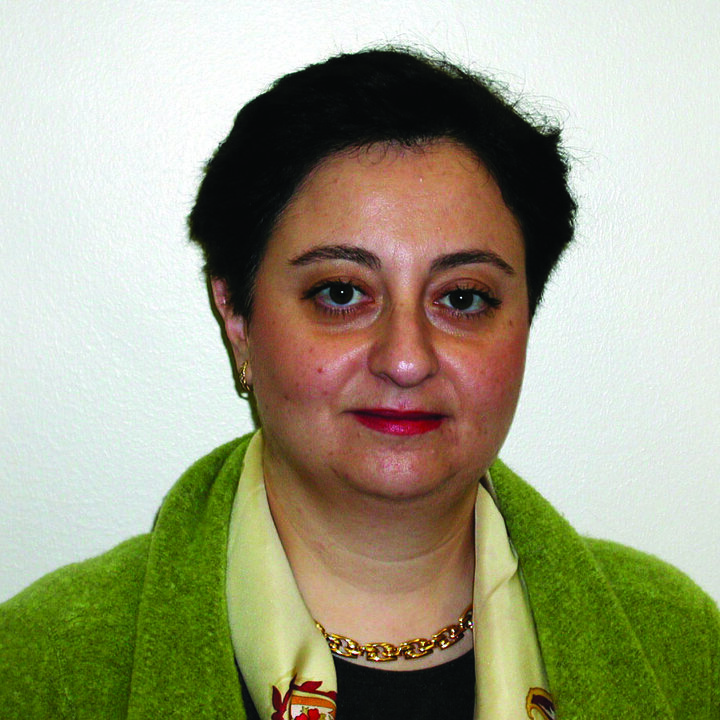The Graduate Certificate in Artificial Intelligence (AI) is designed to equip both current and aspiring computing professionals with a foundational understanding of AI along with a practical proficiency in exploiting AI technologies in the context of their respective fields.
This program allows highly qualified individuals who have earned a bachelor's degree in a computing-related field to extend their education with a graduate certificate in AI. Students will complete five courses, or 15 credit hours, including one required course and four elective courses.
The courses in this certificate program cover core AI topics such as an introduction to AI, constraint processing, machine learning, deep learning, natural language processing, data mining, game theory, and information retrieval. Courses also cover AI application topics such as generative AI, computer systems, visualization, robotics, Internet of Things, data analytics, and bioinformatics.
What You'll Learn
In this graduate certificate program, you will:
- Study foundational and advanced AI concepts
- Develop AI expertise required to excel in modern computing fields
- Expand professional options with skills to advance in AI-centric roles
- Learn how to apply AI in various economic sectors to drive innovation across industries such as healthcare, finance, and technology
The Holland Computing Center
The Holland Computing Center (HCC) provides campus-wide services to researchers who need high-performance computing resources. Powerful supercomputers located in the facility are used by scientists and engineers for many areas of study, including artificial intelligence.
HCC resources are used by students at the University of Nebraska-Lincoln for several courses and are open to graduate certificate students. Students can also sign up for regular training events to learn more about the center’s supercomputers and how to use them for AI research.

The AI Makerspace
The College of Engineering’s AI makerspace, new in 2025 and created in partnership with Omaha’s Scott Data Center, gives University of Nebraska–Lincoln engineering students unrivaled opportunities to explore, build, test and model new techniques using artificial intelligence.
The makerspace will offer access to eight NVIDIA H100 graphics processing units, which are considered the gold standard for multiple types of AI workloads. It is part of an all-encompassing AI initiative underway at Nebraska Engineering and is one of only a handful of such facilities affiliated with higher education institutions across the country.
The AI Makerspace
Admission Requirements
The Graduate Certificate in AI follows and meets all the requirements of graduate admission as specified by the Office of Graduate Studies, including a baccalaureate degree and English language proficiency.
Prerequisites/Deficiency Procedures
In addition to Office of Graduate Studies admission requirements, all students must have:
- A B.S. degree in computer science, computer engineering, software engineering, data science, or equivalent field
- A GPA of at least 3.0
- A resume/CV
Students without a B.S. degree in a computing-related area, but with proficiency in at least one high-level programming language, must take CSCE 802: Data Structures and Algorithms for Informatics prior to taking any required or elective courses.
Additional details about graduate certificate requirements can be found in the university's Graduate Catalog.
Coursework Requirements
To earn the AI Graduate Certificate, students must complete 15 credit hours of coursework, including one required course, CSCE 811: Data Modeling for Systems Development. If a student has taken CSCE 411 at the undergraduate level, this requirement is waived, and 15 credits from electives should be taken. A minimum of six graduate-level credits from the designated Core AI courses are required.
Students without a B.S. degree in computing-related areas, but with proficiency in at least one high-level programming language, must take CSCE 802: Data Structures and Algorithms for Informatics prior to taking any required or elective courses.
All courses are offered by the School of Computing (SoC) Graduate Program.
For additional details and descriptions of our courses, view the course section of this webpage below.
Extending Toward a Master's Degree
The AI Graduate Certificate is designed to allow students to extend it towards a master’s degree (M.S.) in Computer Science (CS Option A and B), an M.S. in Computer Science (Computer Engineering Specialization) (CE Option A and B), or an M.S. in Computer Science (Bioinformatics Specialization) (Bio Option A and B). The courses taken for the AI Graduate Certificate can be used to fulfill the requirements for those degrees, which are summarized in the table below.
Entry into an M.S. program will require a separate application.
| CS Option A | CS Option B | CE Option A | CE Option B | Bio Option A | Bio Option B | |
| Extra credits required for M.S. | Require additional 15 credits. A portion of breadth courses from Theory (6 cr.), Applications (6 cr.), Systems (6 cr.) can be covered in the AI Graduate Certificate + remaining breadth courses + Thesis (6-9 cr.) + 900 level courses (0-9 cr.) | Require additional 15 credits. A portion of breadth courses from Theory (6 cr.), Applications (6 cr.), Systems (6 cr.) can be covered in the AI Graduate Certificate + remaining breadth courses + 900 level courses (6-15 cr.) | Require additional 15 credits. A portion of core courses (9 cr.) and breadth courses (9 cr.) can be covered in the AI Graduate Certificate + remaining core and breadth courses + Thesis (6-9 cr.) + 900 level courses (0-9 cr.) | Require additional 15 credits. A portion of core courses (9 cr.) and breadth courses (9 cr.) can be covered in the AI Graduate Certificate + remaining core and breadth courses + 900 level courses (6-15 cr.) | Require additional 15 credits. A portion of core courses (9 cr.) and breadth courses from Theory (6 cr.), Biosciences (6 cr.), Applications (6 cr.) can be covered in the AI Graduate Certificate + remaining core and breadth courses + Thesis (6-9 cr.) + 900 level courses (0-9 cr.) | Require additional 15 credits. A portion of core courses (9 cr.) and breadth courses from Theory (6 cr.), Biosciences (6 cr.), Applications (6 cr.) can be covered in the AI Graduate Certificate + remaining core and breadth courses + 900 level courses (6-15 cr.) |
| Total | 30 | 30 | 30 | 30 | 30 | 30 |
Completion of Requirements
Students who have completed (or will soon be starting the last semester in which they will complete) the requirements for the AI Graduate Certificate Program must contact the AI Program Coordinator who will assist in reviewing that requirements have been met. Once the requirements are met, the student will apply to receive the certificate per the procedure and deadlines published for degree applications on the Registrar’s website. Students who are concurrently in a degree program must have applied for the certificate prior to the semester in which they plan to receive the certificate.
For more details on completing your graduate certificate requirements, visit the Graduate Studies website.
Frequently Asked Questions
What is a graduate certificate?
A graduate certificate is a set of credit-bearing graduate courses in a specific subject area. It is designed for students who have already earned a bachelor's degree and want to expand their academic or professional qualifications.
How many credit hours are required for the AI graduate certificate?
The AI graduate certificate requires 15 credit hours of graduate-level coursework completed after earning a bachelor's degree.
Can I earn more than one graduate certificate?
Yes, students can pursue multiple certificates. However, only three credit hours may be shared between any two certificates, and each certificate must include at least 12 hours of non-shared coursework. No course can be counted toward more than two certificates.
What are the grade requirements for the AI certificate courses?
Courses must be B or higher. If courses from the certificate are later applied toward a graduate degree, they must also meet the minimum grade requirements of that degree program, which may be higher.
When can I enroll?
Applicants may select their intended first semester in their application.
When will I begin my courses?
If accepted into the program, courses will begin in the term you selected on your application. Failure to enroll in this term first term will result in discontinuation of the program.
Do I need to be continuously enrolled once I've begun taking courses?
There is no requirement to be continuously enrolled for a graduate certificate. This requirement only applies to doctoral degrees at the point of candidacy.
Do I need to be enrolled in a master’s or doctoral program to pursue a graduate certificate?
No, admission to a graduate certificate program is independent of enrollment in a graduate degree program. You may pursue a certificate with or without being enrolled in a master’s or doctoral program.
Can I work on a graduate certificate and a graduate degree at the same time?
Yes, you can pursue both simultaneously, but it is not required.
Can courses from my graduate certificate be applied toward a graduate degree?
Yes, if the courses were taken at the University of Nebraska, they may be applied to a graduate degree, provided they meet all grade and degree requirements.
I am in the Accelerated M.S. program. Can the dual-degree credits be applied toward the graduate certificate?
No, the AI graduate certificate requires 15 credit hours of graduate-level coursework completed after earning a bachelor's degree. Since the dual-degree credits are earned before earning the bachelor’s degree, they do not count. However, M.S. program graduate courses completed after earning the bachelor’s degree may also count toward the graduate certificate.
Can I use courses from a previously completed degree or certificate for a new certificate?
No, courses, which were used to fulfill a previously awarded graduate degree or certificate, cannot be counted again toward a new graduate certificate.
Can I use coursework from another university toward a University of Nebraska graduate certificate?
No, only courses completed at the University of Nebraska are eligible for inclusion in a graduate certificate.
May I use my employee tuition credits for this certificate?
Yes, you can use your employee tuition scholarship towards the certificate.
For more information about graduate certificate requirements and policies from the Office of Graduate Studies, review the graduate catalog.
How to Apply
Application Requirements
Our application process follows the standard university requirements for all graduate programs:
- Application for Admission with $50 non-refundable application fee.
- Transcripts (unofficial): Uploaded as part of application form.
- If International: Uploads must include all college- or university-level transcripts or mark sheets (records of courses and marks earned), with certificates, diplomas, and degrees plus certified English translations.
- After admission: Official documents are required from all students who are admitted and enroll. Photocopies of certified records are not acceptable. International students enrolled in other U.S. institutions may have certified copies of all foreign records sent directly to the Office of Graduate Studies by their current school’s registrar office.
- If applicant’s native language is not English, verification of English proficiency is required.
- When sending TOEFL scores, our institution code is 6877 and a department code is not needed.
- If applicant is not a U.S. citizen and expects an F or J visa: financial information.
- Applicants must also fulfill any additional requirements the school specifies at the time of application, including uploading a resume/CV.
Admission Application Deadlines
Rolling deadline.
For more application information, visit the Graduate Studies website.
Application Submission
Courses
Certificate Courses
To earn the AI Graduate Certificate, students must complete 15 credit hours of coursework, including one required course, CSCE 811: Data Modeling for Systems Development. If a student has taken CSCE 411 at the undergraduate level, this requirement is waived, and 15 credits from electives should be taken. A minimum of 6 graduate-level credits from the designated Core AI courses are required.
Students without B.S. degree in computing-related areas, but with proficiency in at least one high-level programming language, must take CSCE 802: Data Structures and Algorithms for Informatics prior to taking any required or elective courses.
All courses are offered by the School of Computing (SoC) Graduate Program.
Required Course
CSCE 811: Data Modeling for Systems Development
Concepts of relational and object-oriented data modeling through the process of data model development including conceptual, logical and physical modeling. Techniques for identifying and creating relationships between discrete data members, reasoning about how data modeling and analysis are incorporated in system design and development, and specification paradigms for data models. Common tools and technologies for engineering systems and frameworks for integrating data. Design and analysis of algorithms and techniques for identification and exploration of data relationships, such as Bayesian probability and statistics, clustering, map-reduce, and web-based visualization.
Core AI Courses
CSCE 810: Information Retrieval Systems
Outline of the general information retrieval problem, functional overview of information retrieval. Deterministic models of information retrieval systems; conventional Boolean, fuzzy set theory, p-norm, and vector space models. Probabilistic models. Text analysis and automatic indexing. Automatic query formulation. System-user adaptation and learning mechanisms. Intelligent information retrieval. Retrieval evaluation. Review of new theories and future directions. Practical experience with a working experimental information retrieval system.
CSCE 820: Natural Language Processing
Introduction to fundamental concepts and techniques in Natural Language Processing.
CSCE 821: Foundations of Constraint Processing
Constraint processing for articulating and solving industrial problems such as design, scheduling, and resource allocation. The foundations of constraint satisfaction, its basic mechanisms (e.g., search, backtracking, and consistency-checking algorithms), and constraint programming languages. New directions in the field, such as strategies for decomposition and for symmetry identification.
CSCE 822: Introduction to Game Theory
Introduction to essential tools for modeling and analyzing strategic interactions between self-interested agents. Covers key solution concepts used to predict decision-making behavior and examines the computational aspects of these solutions. Explores applications of game theory in areas such as security and social sciences.
CSCE 874: Introduction to Data Mining
Data mining and knowledge discovery methods and their application to real-world problems. Algorithmic and systems issues. Statistical foundations, association discovery, classification, prediction, clustering, spatial data mining and advanced techniques.
CSCE 875: Multiagent Systems
Distributed problem solving and planning, search algorithms for agents, distributed rational decision making, learning multiagent systems, computational organization theory, formal methods in Distributed Artificial Intelligence, multiagent negotiations, emergent behaviors (such as ants and swarms), and Robocup technologies and real-time coalition formation.
CSCE 876: Introduction to Artificial Intelligence
Introduction to basic principles, techniques, and tools now being used in the area of machine intelligence. Languages for AI programming introduced with emphasis on LISP. Lecture topics include problem solving, search, game playing, knowledge representation, expert systems, and applications.
CSCE 878: Introduction to Machine Learning
Introduction to the fundamentals and current trends in machine learning. Possible applications for game playing, text categorization, speech recognition, automatic system control, date mining, computational biology, and robotics. Theoretical and empirical analyses of decision trees, artificial neural networks, Bayesian classifiers, genetic algorithms, instance-based classifiers and reinforcement learning.
CSCE 879: Introduction to Deep Learning
Fundamentals and current trends in deep learning. Backpropagation, activation functions, loss functions, choosing an optimizer, and regularization. Common architectures such as convolutional, autoencoders, and recurrent. Applications such as image analysis, text analysis, sequence analysis, and reinforcement learning.
CSCE 921: Advanced Constraint Processing
A continuation of the course on Foundations of Constraint Processing (CSCE 421/821). Intended for students with some sophistication and considerable interest in exploring methods for designing and using algorithms useful for solving combinatorial problems. The goal of the course is to study, analyze and critique seminal and recent research papers. Projects are optional.
CSCE 970: Pattern Recognition
Introduction to statistical decision theory, adaptive classifiers, supervised and non-supervised training. Pattern recognition systems: Transducers, feature extractors, decision units. Applications to optical character recognition, speech processing, remote sensing.
CSCE 975: Advanced Multiagent Systems
Study of advanced multiagent systems (MAS) in theory, applications, and connections to other AI disciplines, notably in uncertainty reasoning and machine learning. The course is a hybrid of project-based and seminar-based presentations with follow-up discussions. Involve developing and implementing MAS solutions for real-world problems or simulations.
CSCE 976: Advanced Artificial Intelligence
Study, analyze and critique basic and current research papers and to engage in artificial intelligence projects and experiments either alone or in small groups. Artificial intelligence environments, tools and expert system building. Class participation will be encouraged for the review of the more recent AI literature.
Applied AI Courses
CSCE 812: Data Visualization
Fundamentals and implementations of data visualization techniques. Programming skills and practices in interactive visualization applications. Visualization foundations, human perception for information processing, and visualization techniques for different data types, such as scalar-field data, vector-field data, geospatial data, multivariate data, graph/network data, and text/document data. Advanced visualization algorithms and topics as time permits.
CSCE 815: Computational Linguistics
Covers the fundamentals of language modeling, parsing, machine translation, computational and statistical methods in comparative linguistics, laws of phonological change and language evolution, language families and script families, ancient scripts, computational methods for script comparison and the analysis of script evolution.
CSCE 817: Artificial Intelligence For Social Good
Analyzes studies that address societal challenges through machine learning (ML) and, more broadly, artificial intelligence (AI). Focuses on selected research categorized under AI for Social Good (AI4SG), spanning areas such as agriculture, education, environmental sustainability, healthcare, social care, public safety, and transportation.
CSCE 838: Internet of Things
Theoretical and practical insight into the Internet of Things (IoT). Basics of IoT, including devices and sensors, connectivity, cloud processing and storage, analytics and machine learning, security, business models as well as advanced topics such as localization, synchronization, connected vehicles, and applications of IoT. Includes a group project that provides hands-on interaction with IoT.
CSCE 870: Computer Graphics
Display and recording devices; incremental plotters; point, vector, and character generation; grey scale displays, digitizers and scanners, digital image storage; interactive and passive graphics; pattern recognition; data structures and graphics software; the mathematics of three dimensions; homogeneous coordinates; projections and the hidden-line problem.
CSCE 871: Computational Methods in Bioinformatics
Introduction to computational methods for tackling challenges in biological data analysis and modeling and understanding complex systems at the molecular and cellular level. The main topics include bio-sequence analysis, motif finding, structure prediction, phylogenic inference, regulation network modeling, and high-throughput omics data analysis.
CSCE 872: Digital Image Processing
Digital imaging systems, digital image processing, and low-level computer vision. Data structures, algorithms, and system analysis and modeling. Digital image formation and presentation, image statistics and descriptions, operations and transforms, and system simulation. Applications include system design, restoration and enhancement, reconstruction and geometric manipulation, compression, and low-level analysis for computer vision.
CSCE 873: Computer Vision
High-level processing for image understanding and high-level vision. Data structures, algorithms, and modeling. Low-level representation, basic pattern-recognition and image-analysis techniques, segmentation, color, texture and motion analysis, and representation of 2-D and 3-D shape. Applications for content-based image retrieval, digital libraries, and interpretation of satellite imagery.
CSCE 880: Honors: Generative AI – Applications, Ethics, and Research
Focuses on research and discussion to examine recent developments in and the implementations of Generative Artificial Intelligence (AI) systems. Covers ethical implications and potential broader impacts, while applying them to various domains, culminating in a class project. Specific concepts covered include core generative technologies ranging from variational autoencoders (VAEs), generative adversarial networks (GANs), and transformer-based models like large language models (LLMs) and diffusion image generation; key related concepts in terms of data considerations, model parameters and hyperparameters, finetuning and prompt engineering techniques; and practical use cases in terms of technology and industry through research paper reviews and case study discussions.
CSCE 892: Special Topics in Computing (AI Focus)
Aspects of computers and computing not covered elsewhere in the curriculum presented as the need arises.
CSCE 915: Advanced Computational Linguistics
Covers advanced topics in language modeling, machine translation, computational and statistical methods in comparative linguistics, ancient and modern scripts, computational methods for script comparison and decipherment methods.
CSCE 971: Advanced Bioinformatics
Advanced algorithmic techniques for bioinformatics. Development and analysis of string matching, graph theoretic and dynamic programming techniques applied to systems and computational biology problems such s multiple sequence alignment, alignment of DNA and protein sequences, genome rearrangements, and phylogeny and haplotypes.











